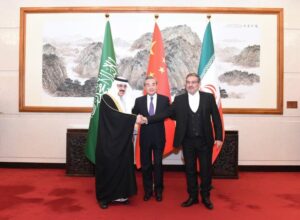THE People’s Republic of China has stepped forward to broker peace in the ongoing Israel-Palestine conflict that is in real danger of spilling over to other areas in the Middle East. President Xi Jinping has reiterated China’s principled stance, emphasizing humanitarianism, justice, and adherence to the United Nations (UN) Charter.
With the conflict causing heavy civilian casualties and a dire humanitarian crisis, President Xi has called for an immediate ceasefire, emphasizing the importance of ending hostilities and ensuring safe humanitarian corridors. He advocates for a two-state solution, building international consensus, and achieving a comprehensive, just, and lasting settlement.
Among the Great Powers, China is in the best position to broker the peace talk, given that the United States has openly sided with Israel while France, Germany and the United Kingdom are merely content in issuing statements condemning Israel’s ongoing genocide in Gaza and the West Bank while actively siding with the United States in the aggression against Yemen and Lebanon.
Russia, meanwhile, is largely preoccupied with its ongoing special military operation (SMO) in Ukraine.
China is also coming off from successfully negotiating the rapprochement between Saudi Arabia and the Islamic State of Iran.

Prior to this historic development, the Saudis have backed the Yemeni government of President Abd-Rabbu Mansour Hadi since 2015 against the ‘Ansar Allah’ (Houthis) rebels who are allegedly backed by Iran along with the ‘Party of God’ (Hezbollah) based in Lebanon.
China’s proposals to the UN Security Council include implementing a comprehensive ceasefire, protecting civilians, ensuring humanitarian assistance, enhancing diplomatic mediation, and seeking a political settlement based on the two-state solution.
President Xi’s personal involvement, including a Congratulatory Message to a UN ‘Special Commemorative Meeting on the Observance of the International Day of Solidarity with the Palestinian People’ last November 30, 2023, underscores China’s commitment to resolving the longstanding conflict.
China vows to continue advocating for fairness and justice, supporting peace talks, and providing humanitarian assistance to Palestine.
Experts see China’s unique position as a close ally to Palestine and a partner to Israel, coupled with its mediation experience, as a credible mediator. They observe that, unlike the perceived bias of some Western powers, China’s impartial stance offers hope for successful negotiations and a peaceful resolution to the crisis.
Recognizing China’s fairness and credibility, the Houthis declared that China’s vessels, along with those from Russia and a handful of other countries passing thru the Red Sea, are “safe” from their attack.
The Houthis decided to turn the Red Sea into a war zone to put pressure on Israel and its Western supporters to stop Israel’s aggression in Palestine that has so far claimed over 30,000 victims, with more than a third of them, children.
